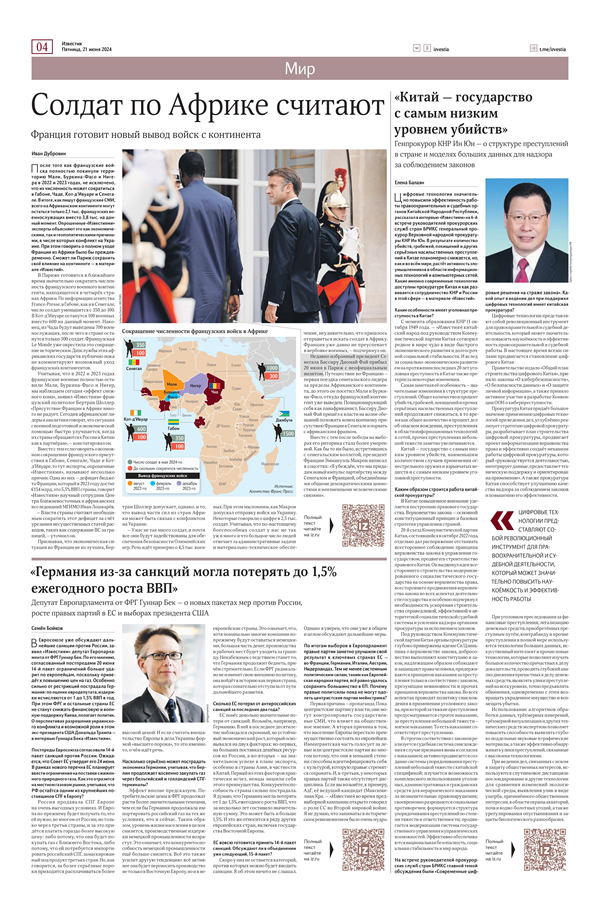
The photo shows the page of the Russian newspaper Izvestia that features the interview with Ying Yong, Chief Grand Prosecutor and Prosecutor General of the Supreme People's Procuratorate (SPP) of China, on June 20.
On June 20, Ying Yong, Chief Grand Prosecutor and Prosecutor General of the Supreme People's Procuratorate (SPP) of China, granted an interview to the Russian newspaper Izvestia on the sidelines of the 6th Meeting of the Heads of Prosecution Services of the BRICS Countries in St. Petersburg, Russia.
Question: What are the characteristics of criminal cases in China? How do Chinese prosecution authorities deal with them?
Ying: Since the founding of the People's Republic of China, the Chinese people have created dual miracles of eye-catching economic development and long-term social stability under the leadership of the Communist Party of China (CPC). Along with the development of the economy and society, criminal cases in China have undergone some changes over the past two decades. There are significant changes in the crime structure. There has been a continuous decrease in the total amount and proportion of serious violent crimes such as murder, robbery and kidnapping, while the number and proportion of minor crimes such as dangerous driving and acts by cybercrime accomplices have significantly increased. China is one of the countries with the lowest rates of homicide, firearms and explosive incidents, and other serious criminal offenses in the world.
China has placed a high priority on the development of the rule of law. Law-based governance is a constitutional principle and a fundamental governance strategy of the country. The 20th CPC National Congress held in October 2022 specifically planned for "adhering to comprehensive rule of law and advancing law-based governance in the country", clearly proposing "comprehensively building a modern socialist country along the path of the rule of law" and "comprehensively promoting law-based governance in all respects", and highlighting "accelerating the development of a fair, efficient and authoritative socialist judicial system" and "strengthening the legal supervision work of the prosecution authorities". Under the leadership of the CPC, Chinese prosecution authorities thoroughly implement Xi Jinping Thought on the Rule of Law, earnestly enforce the Constitution and laws, respect and effectively safeguard human rights. They adhere to the principles of a legally prescribed punishment for a specified crime, presumption of innocence, and no guilt without evidence, and comprehensively and accurately implement a criminal policy combining severity with leniency that upholds the practice of being strict when necessary, lenient when appropriate, and punishing according to the offense. They strictly adhere to the system of leniency for those who confess and repent, actively promote the construction of a system with Chinese characteristics for governing minor crimes, explore the comprehensive use of criminal, administrative, civil and other means to hierarchically punish minor crimes, and resolve social conflicts in a timely manner. They are working to establish a crime governance structure that is well-ordered in severity and with differentiated responsibilities, and promote the modernization of the system and capacity for national governance, effectively safeguarding national security, social stability and the well-being of the people.
Question: The theme of the 6th Meeting of the Heads of Prosecution Services of the BRICS Countries is "Modern digital solutions on enforcement of the law: experience of BRICS prosecution services". What experiences do China's prosecution authorities have in using digital technology to support case handling?
Ying: I presented the development in this regard in China at the 6th Meeting of the Heads of Prosecution Services of the BRICS Countries. Digital technology is a revolutionary means of law enforcement and justice that can effectively enhance technological content and efficiency in law enforcement and justice work. Currently, China is striving to promote the building of a Digital China. The Chinese government has unveiled a plan for the overall layout of the country's digital development, formulated laws such as the Cybersecurity Law, Data Security Law, and Personal Information Protection Law. Additionally, China is actively participating in the formulation of the United Nations treaty on cybercrime. China's prosecution authorities attach great importance to the application of digital technology in judicial case handling, deeply implement a digital prosecution strategy, formulate a plan for digital prosecution development, promote IT application in the rule of law, and effectively construct a mechanism for digital prosecution work that is "business-led, data-integrated, technology-supported and application-focused" to enable the work of legal supervision to improve quality and efficiency. In the prosecution of financial crimes, money laundering, smuggling and other crimes, new technologies such as big data and artificial intelligence are fully utilized to review massive relevant evidence, conduct in-depth analysis of the flow of funds involved, dig deep into upstream and downstream crime clues, accurately charge crimes, and simultaneously trace and recover proceeds. By using data algorithms and technological means such as three-dimensional measurement and imaging for identification, the ability to recognize deeply forged audiovisual materials is enhanced so that clues for high-tech crimes can be effectively identified. In handling public interest litigation cases, technologies such as satellite remote sensing are fully utilized to compare changes in the ecological environment, discover clues of public interest damage in areas such as water bodies, soil, wetland protection, desertification control, and biodiversity protection, and to assess public interest damage and rectification.
China's prosecution authorities focus on analyzing the characteristics and patterns of cases in performing their duties, construct legal supervision big data models, screen more illegal and criminal clues, refer them to competent authorities for investigation, and, in conjunction with case handling, issue prosecution recommendations to competent authorities to promote plugging loopholes, strengthening of supervision, recovering of losses, and advancing from individual case handling to category supervision and then to litigation source governance. To date, China's prosecution authorities have jointly developed more than 6,000 legal supervision big data models, discovered over 620,000 supervision clues in groups, strengthened legal supervision, and effectively achieved systematic governance and litigation source governance.
Question: In recent years, what new achievements have been made in cooperation between Chinese and Russian prosecution authorities? What are your expectations for Sino-Russian prosecutorial cooperation?
Ying: In recent years, under the strategic planning and guidance of President Xi Jinping and Russian President Vladimir Putin, prosecution authorities of both countries have maintained high-standard exchanges and cooperation, achieving fruitful results. Within the frameworks of multilateral mechanisms such as the Meeting of the Heads of Prosecution Services of the BRICS Countries and the Prosecutors General Conference of the Member States of Shanghai Cooperation Organization, the two countries' prosecution authorities have respected each other, communicated in a friendly manner, effectively strengthened law enforcement and judicial cooperation in combating transnational crimes, terrorist crimes, religious extremist crimes, continuously deepened exchanges and cooperation between border region prosecution authorities, and jointly provided strong judicial support for the development and stability of both countries and the region.
Since last year, I have had three friendly, in-depth, and fruitful meetings with His Excellency Russia's Prosecutor General Igor Krasnov. We have established a good working relationship and deep friendship. Last year, the SPP and the Prosecutor General's Office of Russia jointly signed a plan for bilateral cooperation for 2023 to 2024, cooperation agreements in the fields of education, research and specific agreements on local prosecution cooperation. Both sides are actively implementing these cooperation agreements, and more pragmatic exchanges and cooperation are steadily advancing. In September and November last year, prosecutors of both countries were sent to each other's countries for study and visits, from which both sides greatly benefited.
This year marks the 75th anniversary of the establishment of diplomatic relations between China and Russia. In May of this year, after President Putin was re-elected as Russian President, he chose China as the first foreign country to visit during his new term, embarking on a visit to China immediately after taking office as president. President Xi and President Putin met in Beijing, jointly signed and issued a joint statement on deepening the China-Russia comprehensive strategic partnership of cooperation for the new era, charting a blueprint for the development of China-Russia relations in the future at a new historical starting point. The SPP is willing to work with the Prosecutor General's Office of Russia to further deepen friendly exchanges and pragmatic cooperation between the two countries' prosecution authorities under the strategic guidance of the two countries' leaders, and continuously enrich the connotation of China-Russia relations in the new era so as to better benefit both countries and their peoples.
Question: How do you feel about participating in this year's Meeting of the Heads of Prosecution Services of the BRICS Countries?
Ying: This year's Meeting of the Heads of Prosecution Services of the BRICS Countries was held in St. Petersburg, and the Russian side made elaborate preparations and thoughtful arrangements for this meeting, making me and my colleagues feel warmly welcomed. During the meeting, prosecutors general from participating countries shared their countries' concepts, experiences and practices regarding the theme of the meeting, fully consolidating a broad consensus on joining hands to embrace the wave of digital transformation, and demonstrating a broad prospects for exchanges and cooperation in the digital field among prosecution authorities of various countries.
This year's Meeting of the Heads of Prosecution Services of the BRICS Countries was the first meeting after the successful expansion of the BRICS, with countries such as Iran, Egypt, the United Arab Emirates, and Ethiopia joining the meeting. This fully demonstrates the vitality and vigor of this meeting mechanism and further expands its influence in the international judicial field. China's prosecution authorities warmly welcomed the new members and also expressed gratitude to the Russian side for its important contributions to the deepening development of this mechanism. We look forward to working with prosecution authorities of BRICS countries, including the Russian side, to uphold the spirit of openness, inclusiveness, cooperation and mutual benefit, seize opportunities and meet upcoming trends, better utilize the power of the rule of law to serve the modernization processes of various countries, and jointly safeguard the interests of all countries and their peoples.
